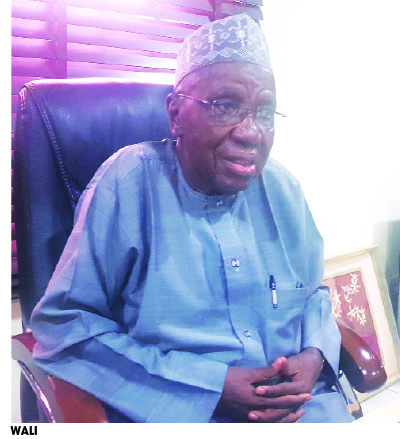DEBORAH TOLU-KOLAWOLE and OLAIDE OYELUDE capture how inmates in an IDP camp in the Federal Capital Territory and some residents in Katsina State are battling cholera
Young Hana Bawa was playing with some of her friends when one of our correspondents visited the Internally Displaced Persons camp in Kuchigoro; a settlement in the Federal Capital Territory. The children, oblivious of their unhygienic milieu, walked and ran gaily around the camp barefooted, playing on heaps of refuse disfiguring various parts of the camp. The nine-year-old has a malnourished stature and is blessed with tall, slim, golden black hair and brown skin. The camps accomodate persons displaced in 2014 by Boko Haram in the North-East.
The settlement is located off the popular Umaru Yar’Adua Expressway, popularly called Airport Road. It shares a boundary with another settlement called Karamajaji.
Although they are situated close to Abuja’s City Gate, the two settlements lack basic amenities. Dirty and unplanned, this possibly explains why the two communities host two IDPs in the FCT. The IDP camps have been in the news lately as the flashpoints of cholera outbreak in the nation’s capital.
The World Health Organisation describes cholera as an acute diarrhoea infection caused by ingestion of food or water contaminated with the bacterium vibrio cholera.
As at August 1, 2021 the Nigeria Centre for Disease Control noted that no fewer than 816 persons lost their lives to cholera in 22 states and the FCT between January 1 and July 31, 2021. The health agency also put the total number of suspected cholera cases at 31,425.
Hana in Hausa means, “A child born into a family while they are mourning the death of a family member.” Her surname, Bawa, indicates, “A male child raised by a foster mother.”
After playing for a while, she went into a makeshift tent made of cellophane and tarpaulin and surrounded by a mini swamp filled with dirt and an open gutter.
“She just survived from cholera but her sister, Ladi, a 12-year-old girl, was not so lucky,’’ says Philemon Emmanuel, the chairman of the IDPs at Kuchigoro camp.
He added, “Her sister was the first death we recorded. Since then, no one else has died but in the Kuchigoro community, we heard that close to 10 people died. Her mother did not know the disease was affecting her daughter until she got to the health centre and they told her it was cholera. The mother initially thought they had malaria, she said they were vomiting and then before she knew it, they went to the hospital in town and she died while Hana survived. Everything happened two or three weeks ago.
“This is not the first time we are experiencing cholera in the camp, it always happens during the rainy season. People started to vomit, some died while others survived. It is sad that this keeps happening every year. We ran away from our ancestral homes because we did not want to be killed but ended up running into a death hole.”
Hana came out of the tent, walked up to a photographer and begged him to take a picture of her. She was excited when he showed her the beautiful shots of her taken.
“She really is a happy child, almost everyone knows her in this camp. Since she recovered and heard that her sister died, she has been a bit quiet, only coming out to play once in a while. Her mother has also been taken to a hospital in Area 1. She was also infected with cholera. We hope she doesn’t die because there will be no one to take care of her and her brother as their father had died in Plateau State and everyone here is struggling to take care of their own,” Philemon added.
Hana didn’t want to talk to Saturday PUNCH initially but after a while, she spoke about her cholera experience and her late sister.
“I was not feeling fine before,” she said in Hausa. “My sister and I started vomiting and we went to a hospital, but now I feel fine. I miss her (her sister). She was my best friend. She wanted to be a nurse while I wanted to be a doctor. Now, I don’t think I want to be a doctor again,” she said innocently.
The situation at the camp was not too fascinating. One of our correspondents who moved round the camp perceived an overwhelming stench thickly in the air. There is only one mini healthcare facility manned by someone referred to as a “chemist” by the residents. He sells drugs ranging from painkillers to anti-malaria drugs among others.
Though the inhabitants of the camp have a bore hole constructed for them by a non-governmental organisation, most of the makeshift tents are surrounded by swamps, open gutters littered with refuse, leftover food and even faeces, exposing that some of the residents engage in open defecation. Some tents also have pits covered with cellophane, where faeces and other human wastes from each tent are deposited. Many of the pits were open and flies had a field day while the women cooked in the locations.
“The rains have made things worse. Water washes faeces and dirt all over the camp. When you wake up at times, the first smell you perceive is that of faeces,” says Hayatu, a resident of the camp.
Commenting on the development, an epidemiologist, Dr Stephen Fagbemi, stated that cholera thrived during rainy seasons.
“During the rainy season like this, cholera disease is always rampant. The issue of cholera is about personal and environmental hygiene. Now that we are in the rainy season, we should make sure that the drains are cleared; we should avoid throwing our waste into the gutters, ’’ he stated.
The NCDC stated that while it had been supporting states to ensure a coordinated, rapid, and effective response to the outbreak, there were challenges in accessing some communities, due to security concerns.
Other challenges listed include inadequate vaccines to cover all council areas, wards and settlements with cholera outbreaks; as well as inadequate health facility infrastructure and cholera commodities for the management of patients.
Hana and her family were not the only ones affected by the outbreak of cholera, in fact, Musa Adze, a 33-year-old farmer who lives in the Kuchigoro community close to the IDP camp lost his brother and his friend.
Adze and his brother, Emmanuel Adze, 32, were farmers who relocated from Kaduna to Kuchigoro community in Abuja. Musa did not know anything about cholera until his younger brother and his friend, Isaac, died.
“Emmanuel na my younger brother and we come here from Kaduna. Na farm work we dey do. His wife and his children dey live for Kaduna. Na after we don work small he tell me say he wan go toilet…


